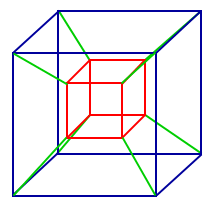The sum of cubes is just the square of the triangular numbers!
13 + 23 + … + n3 = (1 + 2 + … + n)2.
And there is a nice proof by picture, too. Can you figure out how this diagram illustrates the identity?
ABBCCC
BAABBB
BAABBB
BCCAAA
BCCAAA
BCCAAA
Presentation Suggestions:
Draw this picture and see if your students can figure out why the diagram is a “proof without words”!
The Math Behind the Fact:
The diagram illustrates the identity for n=3. Note that the square has (1+2+3)2 letters in it. But now I also claim that there is 13 red letter, 23 green letters, and 33 blue letters.
This can be seen by arranging the letters in “layers” of a cube! The red cube has one layer (A). The green cube has two layers (A and B) with 4 letters in each. The blue cube has three layers (A, B, and C) with 9 letters in each.
This construction easily generalizes for arbitrary n. You can follow this with the Fun Fact Sum of Cubes and Beyond.
How to Cite this Page:
Su, Francis E., et al. “Sum of Cubes.” Math Fun Facts. <http://www.math.hmc.edu/funfacts>.
References:
John H. Conway and Richard K. Guy, The Book of Numbers, pp.58.
Fun Fact suggested by:
Francis Su

